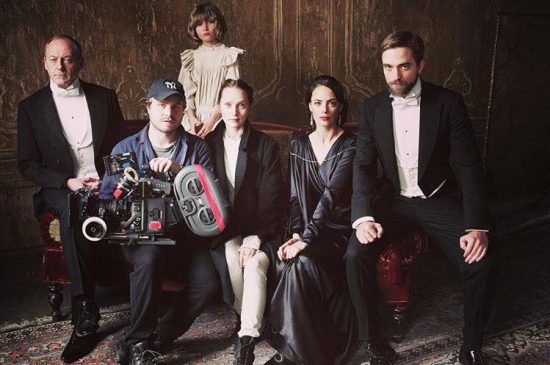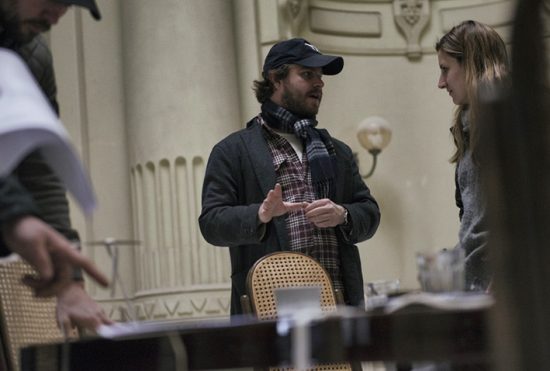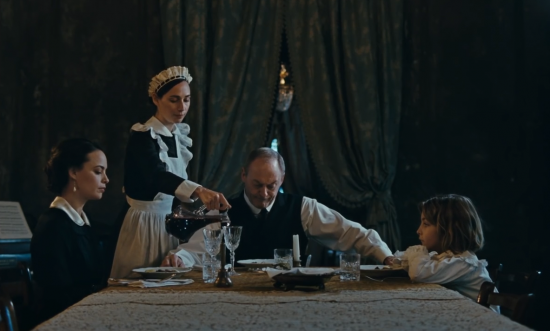The Childhood Of A Leader – Interview with writer/director Brady Corbet
“The whole thing is a ride and you’ve got to do your best to get not too excited when things seems to go very well nor to despair when things are just horrible.” – Brady Corbet
If you thought that indie cinema’s darling Brady Corbet had fallen off Hollywood’s radar, truth is the extremely talented and underrated thespian purposely chose to take his acting career on a relatively low profile. Rather than cash out on his looks and seek out to lead yet another teen dystopia franchise, Corbet picked a path of, so to speak, “minor roles” in auteurs’ films.
The reason behind this move stems from the fact that Corbet’s true calling and passion is to be a filmmaker and after working for many years as a screenwriter (not always credited) for films he sometimes also starred in (Antonio Campos’ Simon Killer is 2012), the Arizona native has finally released his feature film debut as a director, The Childhood Of A Leader, and what a debut it is!
There is nothing common or predictable about Corbet’s first feature and that’s quite a statement to make as usually debuts often tick the Sundance-y boxes of feel-good, coming of age, quirky tales. Funny enough, the film is indeed a coming of age tale but not the one you would expect. It’s a chilling, dream-like, slow-burning look at the rise of authoritarianism in the 20th century through the eyes of a young boy whose father is an American diplomat working for President Wilson in Paris.
Inspired by the actor-turned-filmmaker’s interest in the pivotal albeit flawed Treaty of Versailles and the Interwar period it set the stage for between 1918 and 1939, The Childhood Of A Leader is a stunning, stylish debut brimming with personality and vision. Starring Liam Cunningham (Game of Thrones), Bérénice Bejo (The Artist), Robert Pattinson in yet another credit for his post-Twilight redemption and young British newcomer Tom Sweet in the title role, this is a hypnotising film that’s certainly not for everyone to stomach but that rewards its audience with an explosive outcome to its underlying and ever-mounting tension as it traces this little boy’s developing evil, tantrum after tantrum.
We spoke with Corbet on the phone from Los Angeles for a good half hour and the brilliant auteur-in-the-making, who has just turned 28 this week, graciously gave us a generous insight into his outstanding first film, inevitably starting with where “the directing bug” came from.
“When I was a kid I always assumed that I would make films one way or another. I always planned to make my own films and actually at one point I planned to make this one much sooner but the screenplay was rejected from the Cannes residence and such programs, which was kind of disheartening. Then, I decided to go and make the film anyway and when I really focused on it, it took several years before we could see it come to life because we had so many problems. However I’m happy the film didn’t get made when I was 18 as now it’s a much better movie than it could’ve been, especially because it was worth the wait in order to find (lead actor) Tom Sweet. One year earlier and he would’ve been too young for the role. I guess sometimes you have to put your faith in life that things will happen as they should although the road to get there was quite painful.”
A key moment for Corbet in the path to making his directorial debut a reality was meeting Norwegian actress Mona Fastvold (Love And Other Impossible Pursuits) and help her write her own directorial debut, indie drama The Sleepwalker (2014) that Corbet also co-starred in. From friends and collaborators Fastvold and Corbet became partners in life as well and recently welcomed a daughter.
Corbet reveals that when he decided to pick the script back up, ignore the previous rejections and set out to make it on his own, Fastvold breathed new life into the project.
“When I had started to work on it many years ago, I had written the sequences up until the priest’s sermon which happens about 40 minutes into the film and I was very stuck on this sermon for a long time. It was one of those things where you come at a crossroad and can’t quite figure out how much personal, historical, political detail, to include and I basically just stopped there. Mona looked at everything and thought that the movie was missing a character. So we added the loving and caring French maid played by Yolande Moreau which didn’t exist at all in the previous draft and that’s actually why she’s called Mona by the way. I know this isn’t the warmest movie ever made but the bit of warmth in there is definitely due to Mona’s contribution. I have a rather theoretical approach and at times it can be a bit suffocating of a narrative. Mona grew up performing Ibsen and such when she was very young and she’s classically trained and actually I think all that classical know-how is what gave the film its sort of classical feel. It was one of those cases when one night at dinner I was telling her how the rest of the story was supposed to be in detail and she was like: just finish it for Christ’s sake! So we sat down and we finished it together.”
Getting the script to the right stage was just the tip of the creative iceberg for Corbet, who faced many challenges in order to produce a period piece set in between the two World Wars, shot on 35mm film as his feature debut.
“The thing with the movie is that frankly, there were too many duties for one person to pull off. So we started to divide up certain tasks. Mona was directing second unit on the film but in general we were supposed to have 8 weeks of prep which ended up being 3 and 1/2 and that’s unheard of and quite ridiculous. We shot the film in 24 days, in four 6-day weeks and it was a relentless production, so Mona was the only person I could trust to be my other set of eyes and ears and I’ve always been that for her as well. We know what the other one likes and although we have different preoccupations and a different approach and style, at the end of the day they’re very similar so it’s not difficult for us to be each other’s support.”
Despite initial speculations that the titular leader was meant to be either Hitler or Mussolini, ever since the film premiered at last year’s Venice Film Festival (where it won the awards for best first feature and best director in the Horizons section), Corbet has made clear how the project is meant to be a fictitious tale and an allegory rather than a history lesson.
“The film is about how the bureaucratic rhythms, the religious doctrine, the oppression of women, the authoritarian status quo of parenting partially paved the way for this kind of uprising. It’s almost as much about the weather as it is about a moment that defined this young man. I don’t think we’re defined simply or in one moment. I was thinking a lot about Camus’ The Stranger, when the protagonist finally sort of unleashes the reason why he’s pulled the trigger and shot this other man six times or so. I was fascinated by the idea that this sort of depression is shaping this young man but because the film is about a time that already happened I didn’t want to be didactic.”
It’s a pleasure listening to Corbet speaking so passionately about his craft. Incredibly cultured and sophisticated, the young artist surely has had the best kind of film school experience, working with masters like Haneke (Funny Games’ US remake), Araki (Mysterious Skin) and Von Trier (Melancholia). No surprise then how his view on the eternal dilemma of art versus commerce is unapologetically bold.
“Anybody who thinks that anything should be a certain way and that there’s only one kind of narrative is ridiculous. I have no problem when I make something that someone just doesn’t like but it’s always frustrating when someone assumes that there’s only one way to bake a cake and that this is not as good a piece of cake because you didn’t include as much sugar. The thing that was very painful for me during my experience with Childhood is how between Venice and now the film was being rejected from every single top tier film festival and basically everywhere in the US and in North America. It wasn’t shocking that a programmer didn’t like the movie but it was bizarre that so many programmers did not think this film was worth exhibiting, especially with festivals showing between 50 and 300 titles like Toronto or 130 titles like Sundance. It’s been a very strange experience because the movie was very divisive in Venice and then it won two prizes. Yet it was very painful that my film wasn’t valued in the country I’m from. Now it’s been released in the US and it’s been mostly acclaimed but we had a year of feeling quite sad because I thought there would be more people that wanted to support this kind of film. In the long run it’s just a very important lesson for me to keep close to my heart: you’re not really making movies for other people, you are making films that you yourself would hope to see and in the way you’d hope to see them made and you hope that some other people discovered it as well. I think in a way if you’re making something for other people is quite presumptuous and ultimately it’s quite a corporate attitude to think you know what the masses want. You have to make what you want to make and you can’t be afraid of it because it’s commercial, yet you should never make something because you think it’s going to be seen by a lot of people, that’s the wrong approach.”
The young filmmaker is already hard at work on his sophomore effort, Vox Lux, which is a completely different kind of story, genre and cinematic style. Corbet reflects on his evolution as an artist and how his personal life has informed his artistic choices.
“It’s funny that I had a child whilst I was making this movie. I didn’t have that many opinions while I was making it because I was such a new parent and yet my next film I wrote specifically in reaction to becoming a parent. That’s going to be a movie about mothers and daughters and it’s focused on different generations of women and I wrote it for my daughter, thinking about my daughter. It spans from 1999 to practically present day and it’s a little bit more of a political film in a way because actually it’s protesting something that’s sort of ongoing. It’s about the rise of a popstar and it’s got a much stronger connection and message associated with youth than my first one. The most exciting thing is that we’re shooting 65 mm so it’s going to be quite an experience. I’m in LA right now doing some preliminary work on the soundtrack, which we need to have prepared quite in advance of shooting. It’s going to be a pop musical in 65mm and we’re starting to shoot at the beginning of the year.”
The Childhood Of A Leader is out in the UK in limited release and on VOD from August 19th.

















